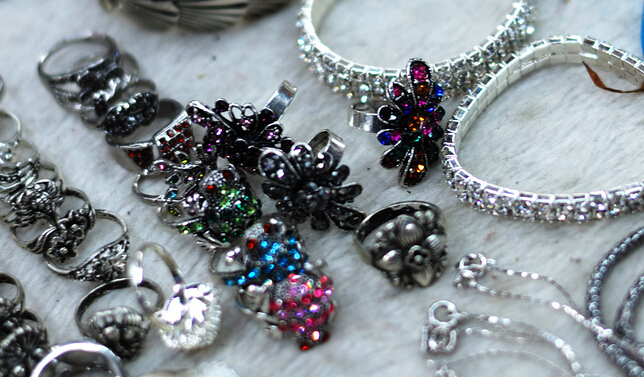(单词翻译:单击)
情景对话
Todd: Okay. That brings up a good question because we're talking about shoes. How important is fashion for you? Are you willing to wear uncomfortable clothing to look good?
托德:好。这引出了一个好问题,因为我们在谈论鞋子。时尚对你来说有多重要?你愿意穿看上去很漂亮但是并不舒服的衣服吗?
Jen: Not always, because I really like comfort. I would rather wear pajamas and go out than, like you know, wear something really uncomfortable. But it depends, like if you're going to a party then you would obviously want to look good and wouldn't really care about comfort much. But in a daily basis, I would go for comfort always.
珍:不一定,因为舒适感对我来说很重要。我宁愿穿睡衣出门,也不愿意穿非常不舒服的衣服。但是这要视情况而定,如果要去参加派对,那肯定想让自己看上去很漂亮,这时我就不太在乎舒适感了。不过就日常着装来说,我一直选择舒服的衣服。
Todd: Okay. Nice. How about for example, jewelry? Do you like to wear necklaces, earrings, rings, things like that?
托德:好。不错。那珠宝首饰呢?你喜欢戴项链、耳环、戒指之类的饰品吗?
Jen: No, I'm not much of an accessories person.
珍:不喜欢,我不太喜欢饰品。
Todd: Okay. Now in your home country, Nepal, is it common for people to wear a lot of jewelry?
托德:好。那在你祖国尼泊尔,佩戴很多首饰普遍吗?
Jen: Yes, they do.
珍:很普遍。
Todd: Oh yeah? Oh, okay. What do people like to wear?
托德:是吗?好。人们喜欢戴什么首饰?
Jen: Everyone prefers gold I guess, because it's like people think that if you wear gold then you are rich. And yeah, gold, silver, and some wear diamonds.
珍:我认为所有人都喜欢金饰,因为人们认为戴金饰说明很有钱。他们会戴金饰、银饰,有时还会戴钻石。
Todd: Okay, nice. Nice. I don't have any jewelry, I don't think. Oh wow, I didn't even realize that. I don't have one piece of jewelry.
托德:哦,不错,真好。我没有珠宝首饰。哇哦,我甚至没有意识到这件事。我一件首饰都没有。
Jen: Really?
珍:真的吗?
Todd: Yeah, I have no rings. No necklaces. I have a broken watch. But yeah.
托德:对,我没有戒指、项链。我有块坏了的手表。就是这样。
Jen: Don't you ever feel like buying one though? Don't you ever follow a trend and thought about piercing your ears or something?
珍:你没想过买一件吗?你没有跟随潮流吗?没想过打耳洞之类的吗?
Todd: That would be interesting, piercing my ears. You know, when I was your age, which was about over 20 years ago, it was just starting to happen that boys or men would pierce their ears. But it was a bit controversial, it wasn't like it's common now. So yeah.
托德:打耳洞,那应该很有意思。你知道,我在你这么大的时候,大约20年前吧,刚刚有男孩或男性开始打耳洞。不过当时那有点儿争议,不像现在这么普遍。情况就是这样。
Jen: What about necklaces?
珍:那项链呢?
Todd: Yeah, I used to have a necklace, yeah. And I just stopped wearing them, it's just not a thing. Yeah. How about you? Would you like to have piercings? Like do you have, you have earrings, right?
托德:我以前有项链。不过我已经不再戴了,不是什么重要的东西。你呢?你想穿孔吗?你有耳环,是吧?
Jen: Yes, I do, but I rarely use them because at some point it's just hurts and you just feel like you don't really need it, so yeah.
珍:我有,不过很少戴,因为有时会弄伤自己,让我感觉其实并不需要它。
Todd: What about in your country, do people have piercings in different places like eyelids or lips or ... ? Like a nose ring?
托德:那你祖国尼泊尔的民众会在不同地方穿孔吗?比如眼皮或嘴唇之类的地方?或者会戴鼻环吗?
Jen: Yeah, they have nose ring and then they also pierce their ears, like in so many different places. But I've never really seen anyone really piercing their eyelids or stuff. I would want to pierce my-
珍:会,他们会戴鼻环,会打耳洞,也会在不同的地方穿孔。不过我从来没见到有人在眼皮上穿孔的。我想穿孔的地方是……
Todd: Belly button? The belly button?
托德:肚脐?在肚脐上穿孔?
Jen: Yes.
珍:对。
Todd: Oh my gosh, that looks like it would hurt.
托德:哦我的天哪,那会很疼吧。
Jen: I know-
珍:我知道。
Todd: So much.
托德:非常疼。
Jen: -but I really want to do it.
珍:不过我非常想在肚脐上穿孔。
Todd: Really? All right, well, just be careful.
托德:是吗?好吧,要小心一些。
Jen: Okay, I will.
珍:好,我会的。

译文属可可原创,仅供学习交流使用,未经许可请勿转载
重点讲解
重点讲解:
1. bring up 提出;
例句:We decided to bring up the problem at the next meeting.
我们决定在下次会议上提出这个问题。
2. would rather do sth. than do sth. 宁愿做某事不愿做某事;
例句:I would rather hoe in the garden than run on the playground.
我宁愿在花园里锄草,不愿在运动场上跑来跑去。
3. care about 关心;在乎;在意;
例句:I don't care about the matter.
我对这事毫不介意。
4. go for 非常喜欢;选择;
例句:I don't go for men of his type.
我不喜欢他那种类型的人。


